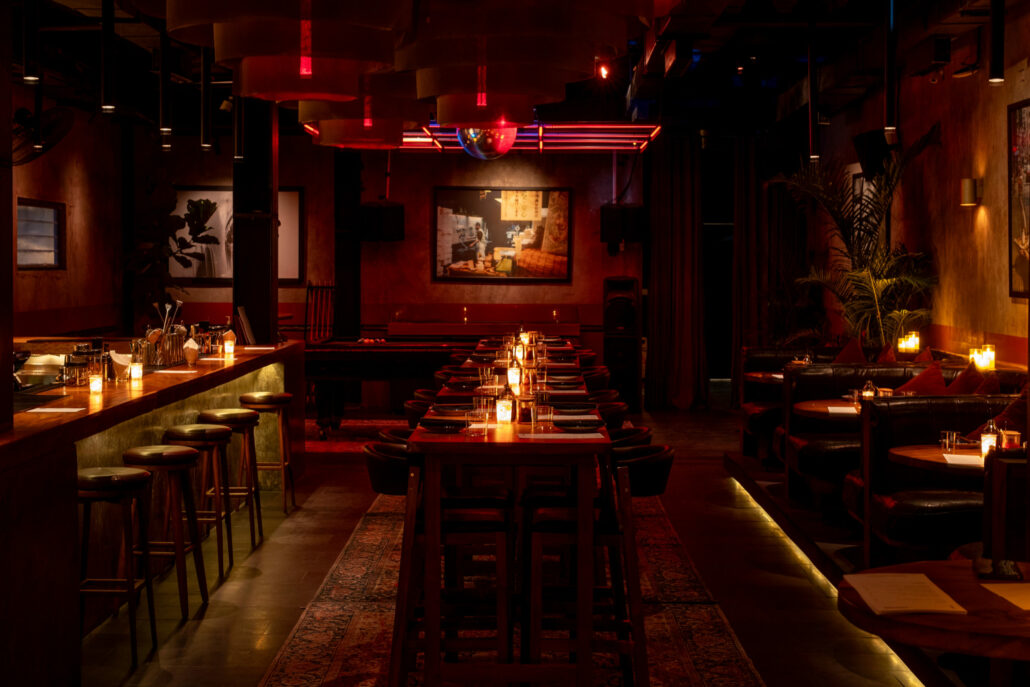“E se lo facessi a modo tuo? Nessuna regola, nessun giusto o sbagliato, solo ciò che pensi sia bello?” fa riflettere l’autrice di libri per bambini/e Sandra Magsamen. Quante volte agiamo basandoci sulle influenze esterne piuttosto che sul nostro profondo sentire? Si tratta di uscire dalla comfort zone, seguire quella spinta interiore più pura e libera da vincoli, accettare il rischio di sbagliare e forse di aprire scenari capaci di generare valore e nuovi stili di vita pieni di bellezza e benessere. Shanti Allen, chef internazionale e una delle fondatrici di Alchemy, il primo ristorante vegano a Bali, è riuscita a fare questo salto andando nella direzione dei suoi sogni fatti di amore per il Pianeta e di passione per il cibo plant-based. Nel 2017 ha fondato così l’Alchemy Academy, un luogo dove formare nuovi “alchimisti” approfondendo e sperimentando le straordinarie potenzialità del cibo vegano e imparando a pensare fuori dagli schemi. E a sognare in grande, molto in grande, a credere nel flusso della vita, nella sincronicità degli incontri e nella forza dei legami come quelli creati durante il corso di Livello 1 dedicato al cibo vegano crudo, svoltosi dall’8 al 19 luglio 2024 con persone da tutto il mondo a cui ho avuto l’onore e la fortuna di partecipare. Brasile, Ucraina, Norvegia, Inghilterra, Sud Africa, Caraibi, Spagna, Svezia, California, Turchia, Germania, riuniti sotto lo stesso tetto in una cucina open space immersa nella giungla, desiderose di approfondire questo mondo così affascinante, pieno di meravigliose possibilità e così prezioso per la nostra salute e al contempo per il Pianeta. Non a caso l’Alchemy Academy si trova nella città di Ubud, capitale culturale dell’isola, la cui parola deriva dal balinese Ubad che significa medicina, ispirata dall’abbondanza di piante medicinali ed erbe presenti in questa zona, una città in cui artisti, intellettuali, scrittori si spostarono negli anni 70, un movimento di enorme portata da cui originò la splendida energia presente ancora oggi.
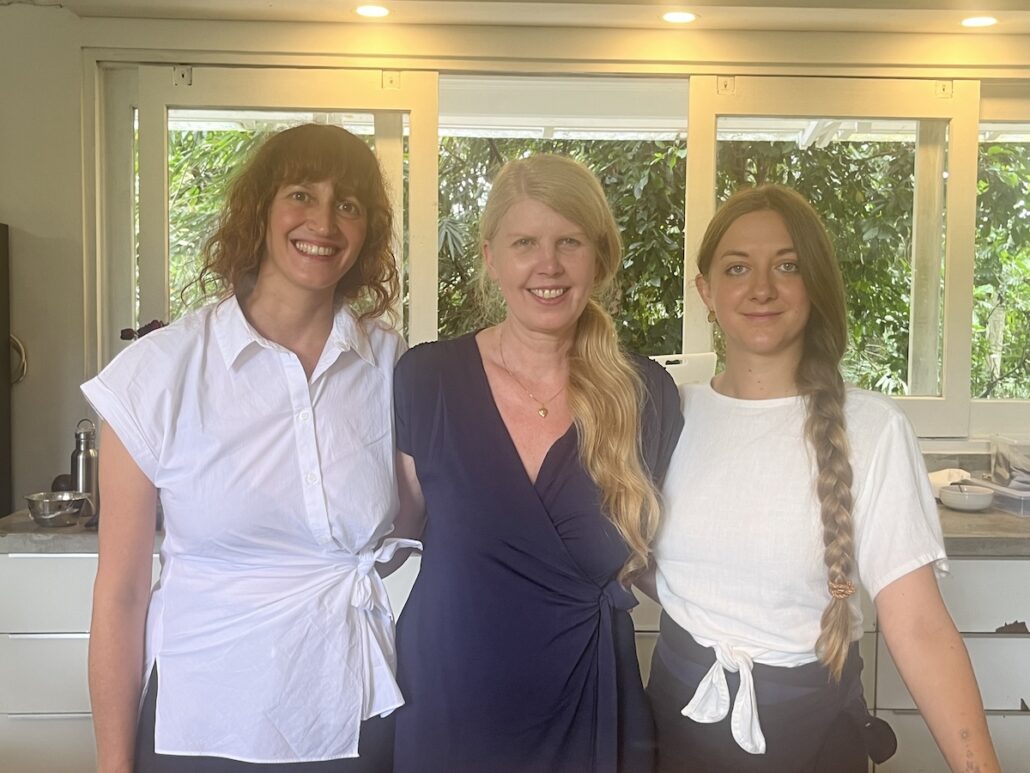
“Il cibo crudo è un invito a mangiare di più in linea con madre natura” racconta Shanti, il cui nome dal sanscrito significa “pace interiore” proprio quello che lei stessa incarna e che cerca di trasmettere attraverso questo rivoluzionario modo di vivere. “Gli ingredienti sono lavorati il meno possibile per esaltarne e preservarne l’essenza così come il valore nutrizionale. Nella cucina crudista viene utilizzata tanta frutta, verdura, erbe, noci, semi, germogli, spezie e supercibi freschi, biologici e dai colori vivaci. Contengono naturalmente tutte le vitamine, i minerali, i fitonutrienti, le fibre e gli antiossidanti necessari per nutrire e sostenere noi esseri umani ma non è necessario convertire totalmente la nostra dieta al cibo crudo. Semplicemente aggiungere il 50% di verdure o frutta fresche e crude ai nostri pasti ordinari è già un’azione che può avere un impatto incredibile sulla nostra salute e sull’ambiente. Questo perché meno il nostro cibo è elaborato e cotto – infatti in questo tipo di alimentazione la temperatura della “cottura” nel disidratatore non deve essere superiore a 43°C (118°F) – più forza vitale trattiene. E quando mangi forza vitale, ottieni forza vitale come racconto nel mio primo libro The Raw Alchemist”.
Shanti parla lentamente, con dolcezza e riflettendo sulle parole. Un ritmo che trasmette tranquillità, un modo di interagire che sovverte la frenesia e che riporta al qui e ora. Stare nel momento presente e prendere coscienza profonda di ciò che siamo e facciamo è fondamentale per imparare a conoscere e rispettare i nostri reali bisogni e riportare la nostra attenzione su ciò che davvero conta. “È scientificamente dimostrato – prosegue – che i benefici dell’alimentazione crudista siano innumerevoli: assorbimento di enzimi che altrimenti sarebbero uccisi dalle temperature alte della cottura; maggior idratazione per il corpo nel modo più naturale possibile poiché la verdura e la frutta fresca contengono più dell’80% di acqua; supporto nel trovare il proprio peso forma quindi a non andare verso gli eccessi sempre dannosi; miglioramento della salute e della longevità aiutando a ridurre l’insorgere di diabete, artriti, coliti e cancro; benefici nel non accumulare tossine nel colon e negli organi e ha un impatto sull’ambiente molto ridotto rispetto a un’alimentazione onnivora”. È un vero e proprio approccio olistico e benefico verso la vita la cui essenza tocca anche quei piani più sottili e invisibili. Alla base del cibo vegano, infatti, c’è la profonda convinzione che tutto sia interconnesso: la natura, le persone, le esperienze, ogni cosa ha un profondo significato.
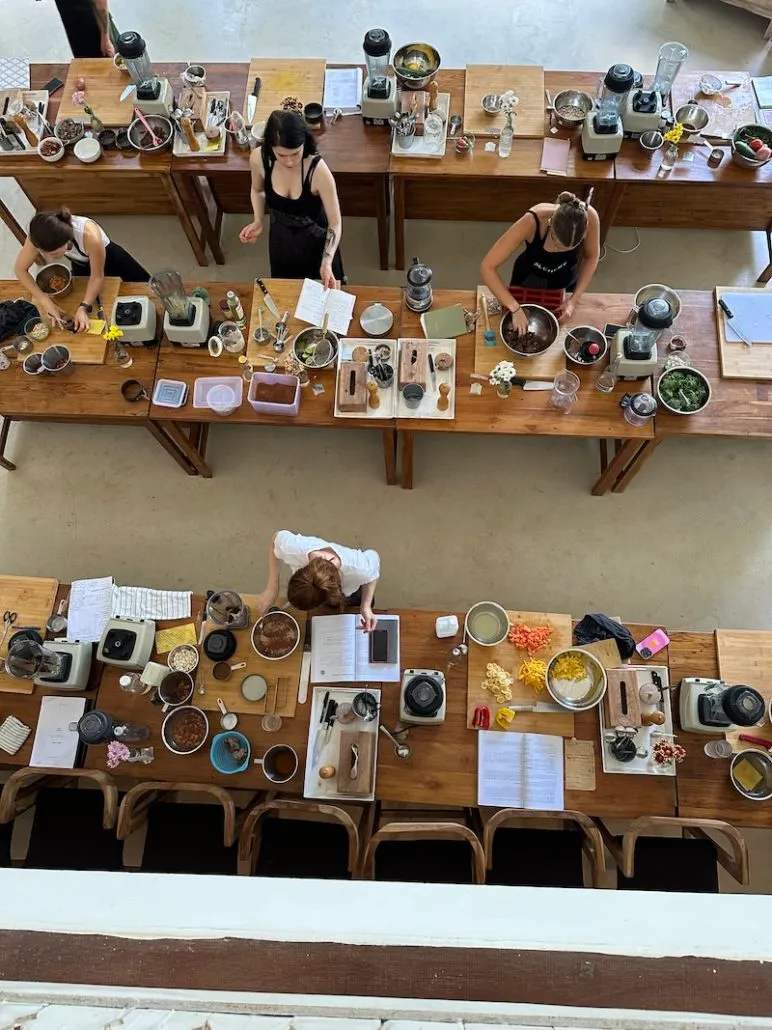
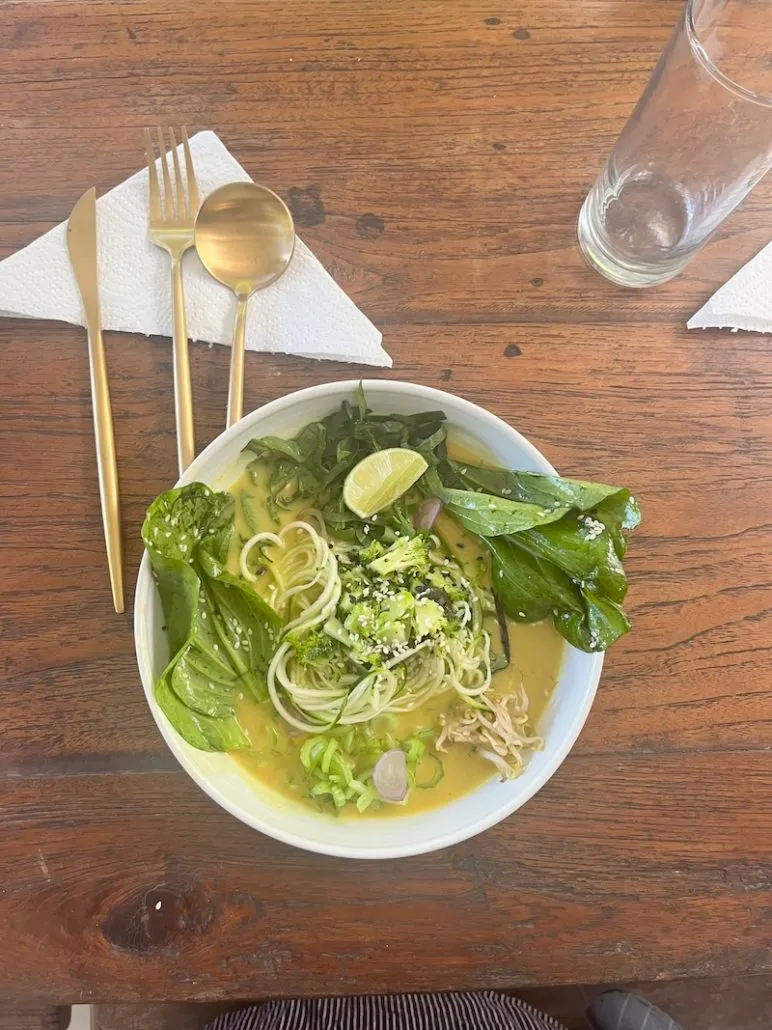
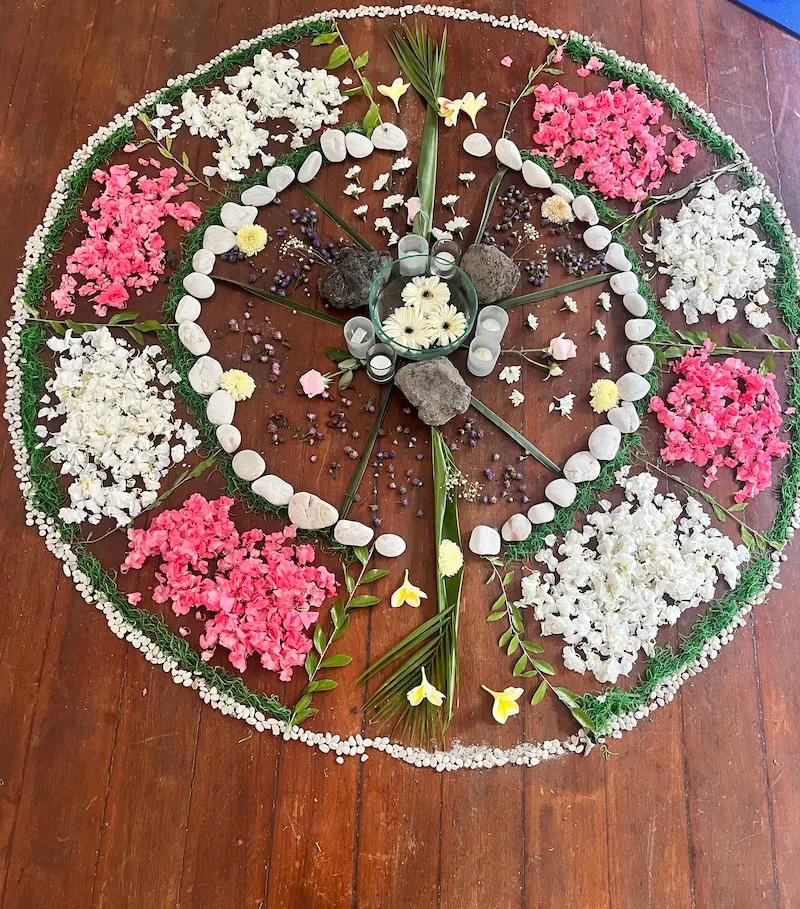
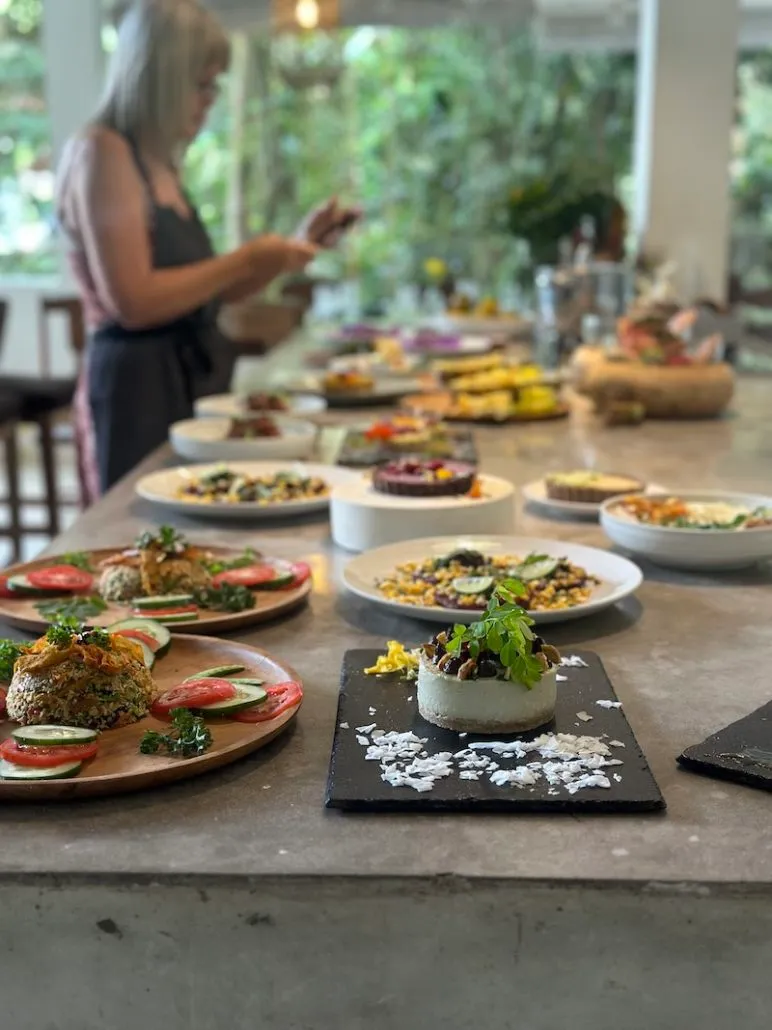
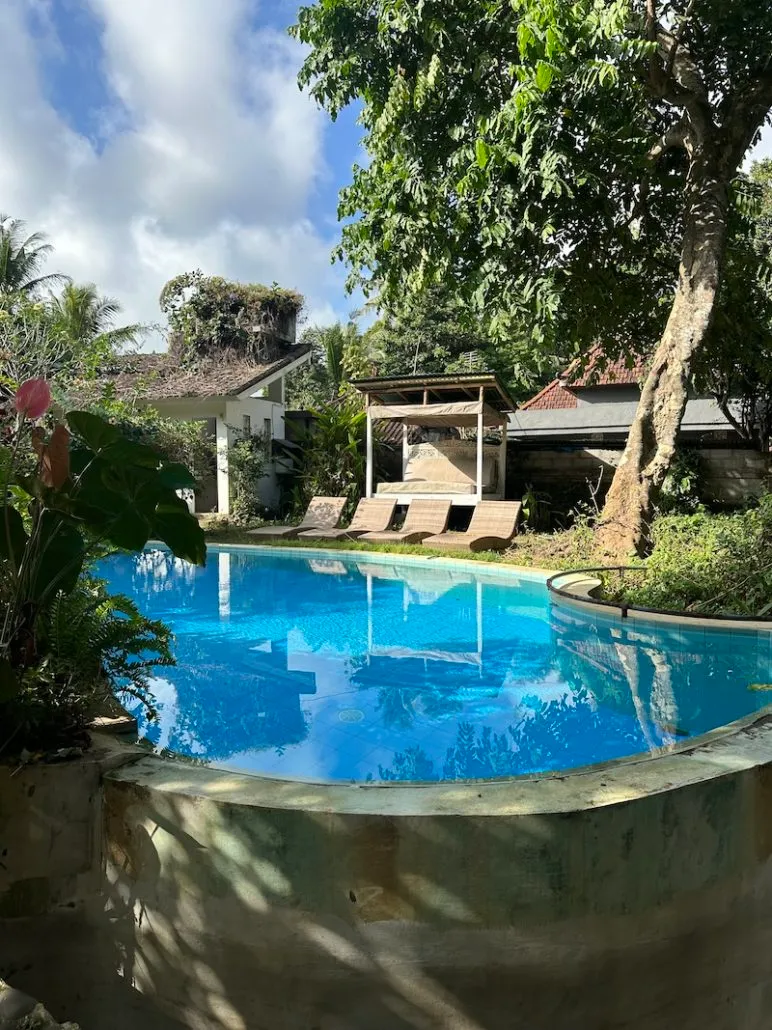
Per questo durante il corso la parte pratica e materiale del preparare il cibo è stata costantemente accompagnata dal prendersi cura anche del piano interiore, quella sfera emotiva inscindibile con l’esterno e fondamentale per avere l’atteggiamento giusto per creare felicità e valore intorno a noi. La cerimonia di apertura del corso è stato il primo esempio di quanto sia importante metterci in relazione con noi stessi e gli altri, di partire dai legami. Intorno a un bellissimo mandala fatto di colorati fiori, pietre e candele realizzato dall’insegnante di yoga Emmalee Bevan, presente ogni mattina per chi volesse iniziare la giornata in modo rigenerante, abbiamo condiviso pensieri, emozioni, esperienze per incoraggiarci e ispirarci a vicenda. Ogni giorno è stato scandito da un programma ricco e variegato organizzato in base al manuale di riferimento con tutte le ricette elaborate da Shanti e guidato con professionalità ed entusiasmo dalle chef Lauren Lovat e Carolina Rodriguez, tra le maggiori esperte a livello internazionale di cibo plant-based, capaci di ascoltare con pazienza e gentilezza ogni dubbio e difficoltà mettendo al centro un rapporto paritario. “Il ruolo dell’insegnate – ha affermato Carolina – non è quello di fornire risposte ma di porre le domande giuste per aiutare le persone a trovare la giusta risposta per quello che vogliono realizzare. Il cibo plant-based apre a un’infinita creatività e quindi è importante capire prima di tutto cosa si vuole realizzare. La visione che si ha di un piatto è fondamentale. L’altro aspetto importante è il sapore che riusciamo a creare attraverso la combinazione dei vari ingredienti. Quando si tratta di cibo crudo, dove la lavorazione avviene con una materia prima più delicata, è necessaria tanta concentrazione e attenzione”.
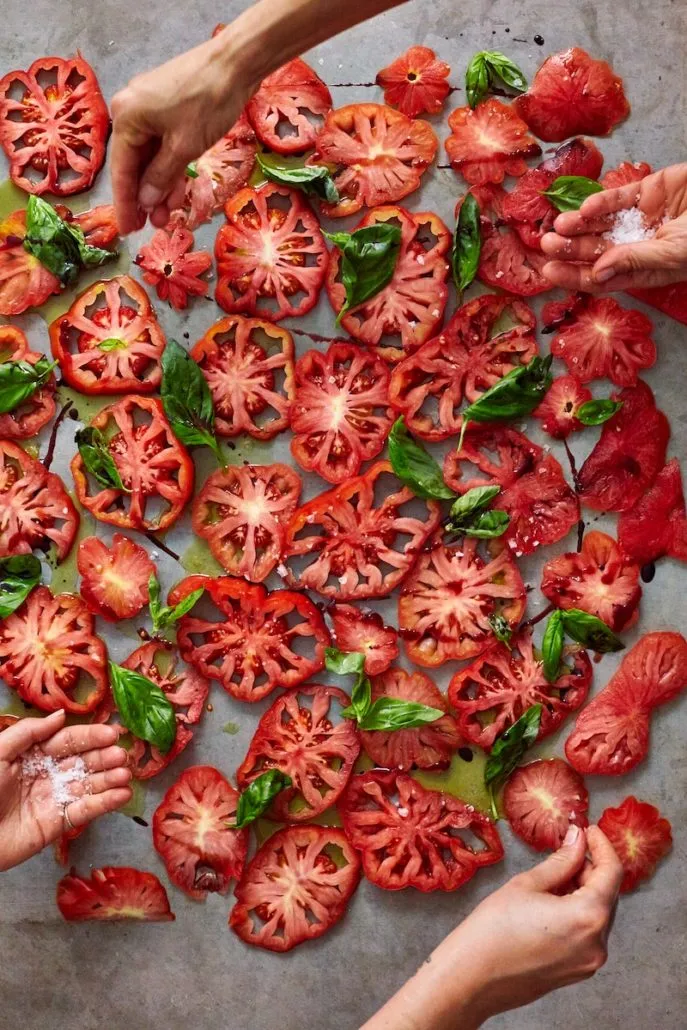
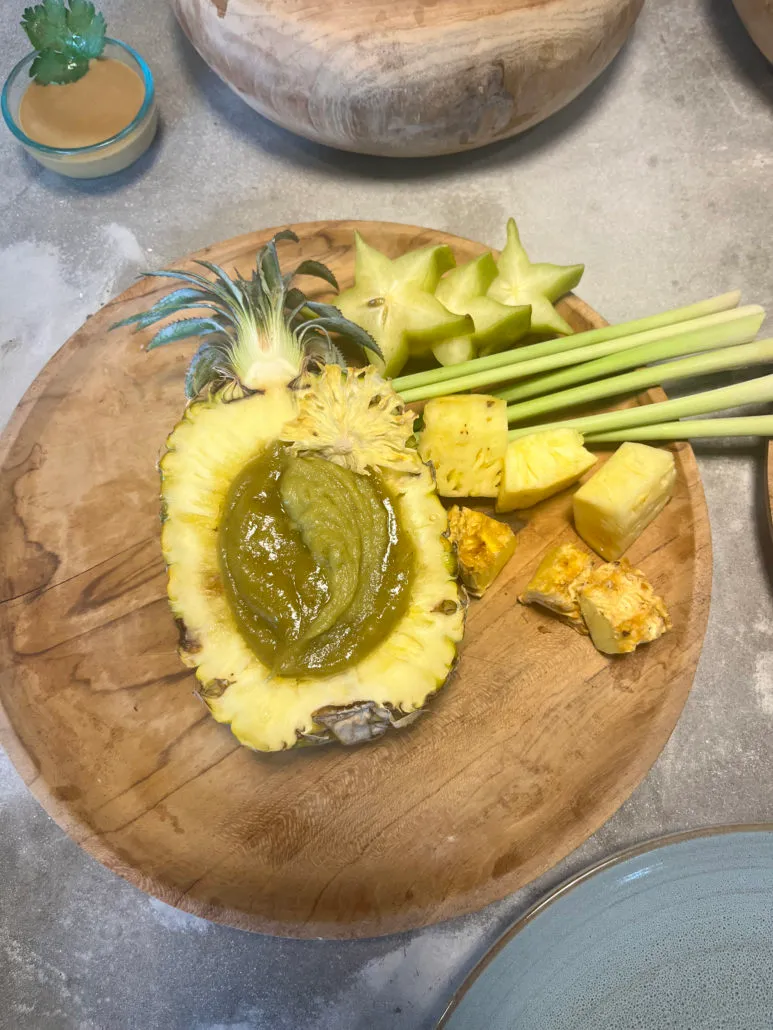
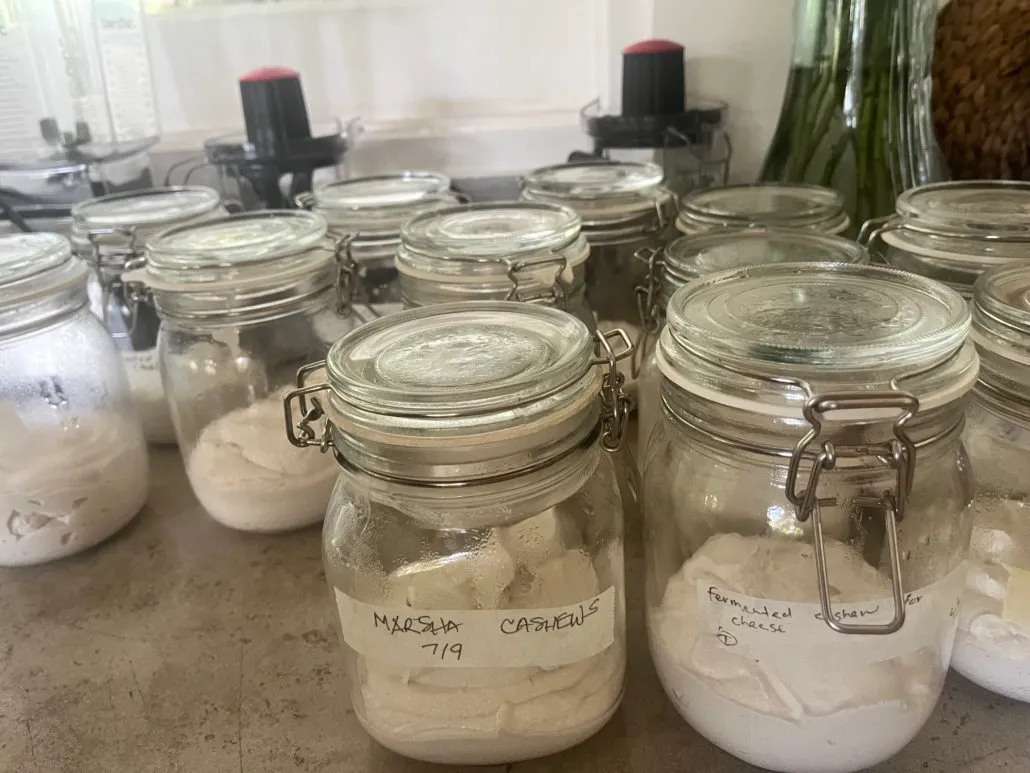
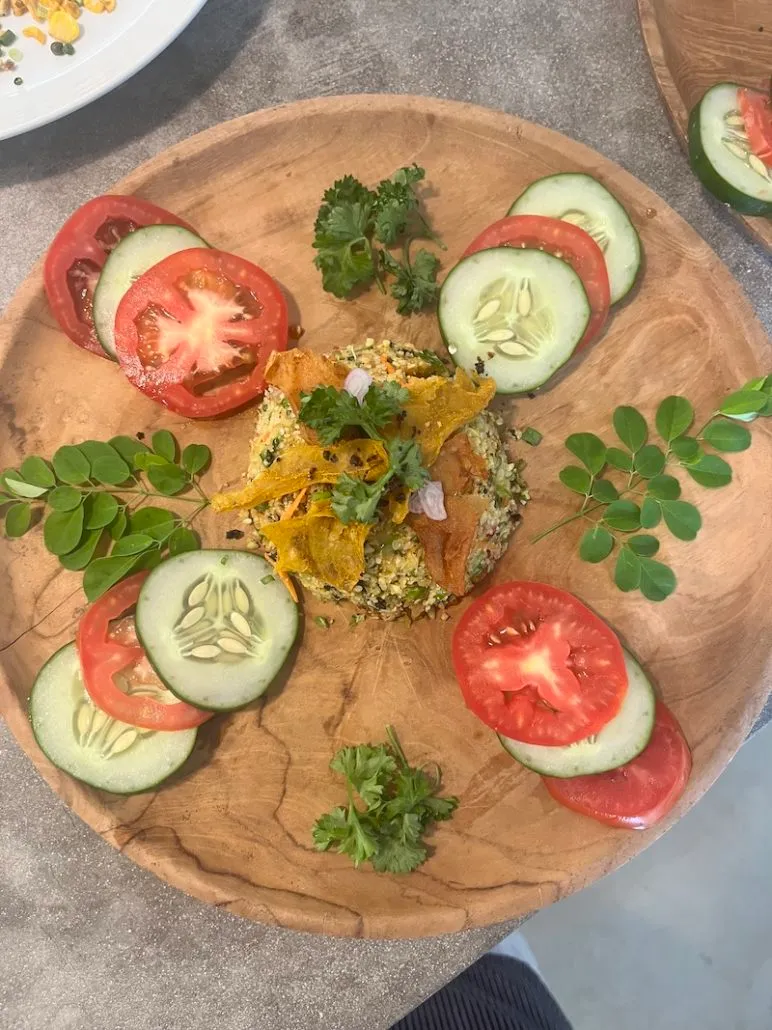
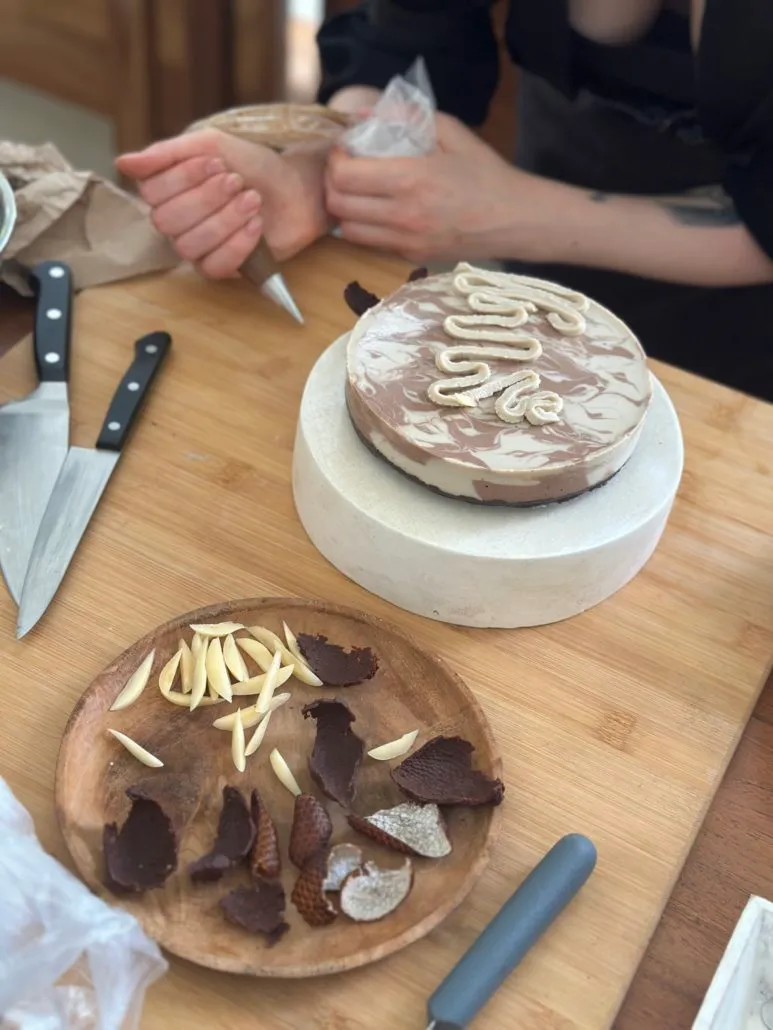
Trovare la combinazione di sapori in grado di sprigionare quello che si desidera realizzare – quell’alchimia che avviene attraverso una lunga concentrazione e sperimentazione – richiede tanto tempo e pazienza ma prima di tutto si parte da un elemento fondamentale: la pulizia e la mise en place. Questi sono stati i primi argomenti trattati durante le lezioni, quelle fondamenta necessarie per creare una struttura solida. Già dal secondo giorno ci sentivamo dentro a un flusso fatto di movimenti, di consapevolezza dei luoghi da cui attingere gli ingredienti, di ricette (che abbiamo imparato a leggere) e anche di sguardi, complicità con la propria vicina di posto con cui spesso si collaborava nel creare i piatti. Un’armonia nata con spontaneità attraverso la chiarezza, l’entusiasmo e la professionalità di Lauren, Carolina e Shanti, così come dalla predisposizione delle studentesse a imparare e crescere con sensibilità e passione. Da questo è germogliata un’atmosfera gioiosa e costruttiva anche quando qualcosa non riusciva come desiderato per poi fiorire pienamente dopo due settimane di intenso lavoro nel progetto finale. Ognuna ha lasciato libero sfogo alla propria fantasia creando un piatto principale e un dessert: dalla versione raw e vegan di piatti tipici balinesi, all’ispirazione nata dal proprio Paese di origine o dalla rigogliosa natura e degli animali presenti a Bali ognuna ha potuto esprimere appieno sé stessa.
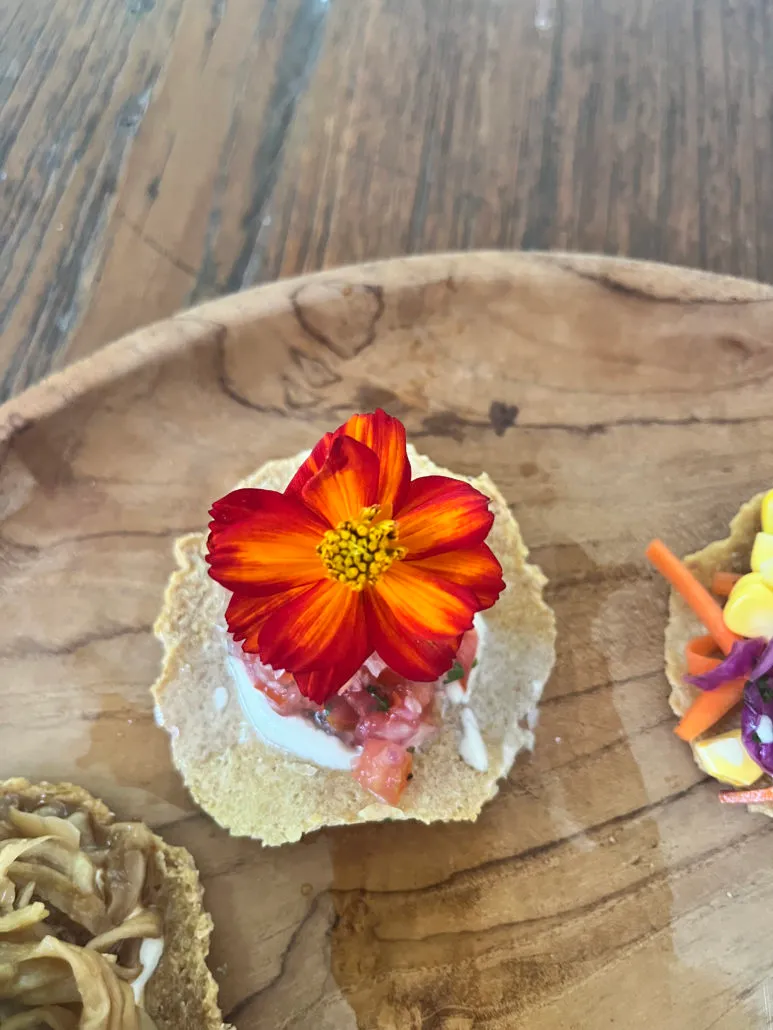
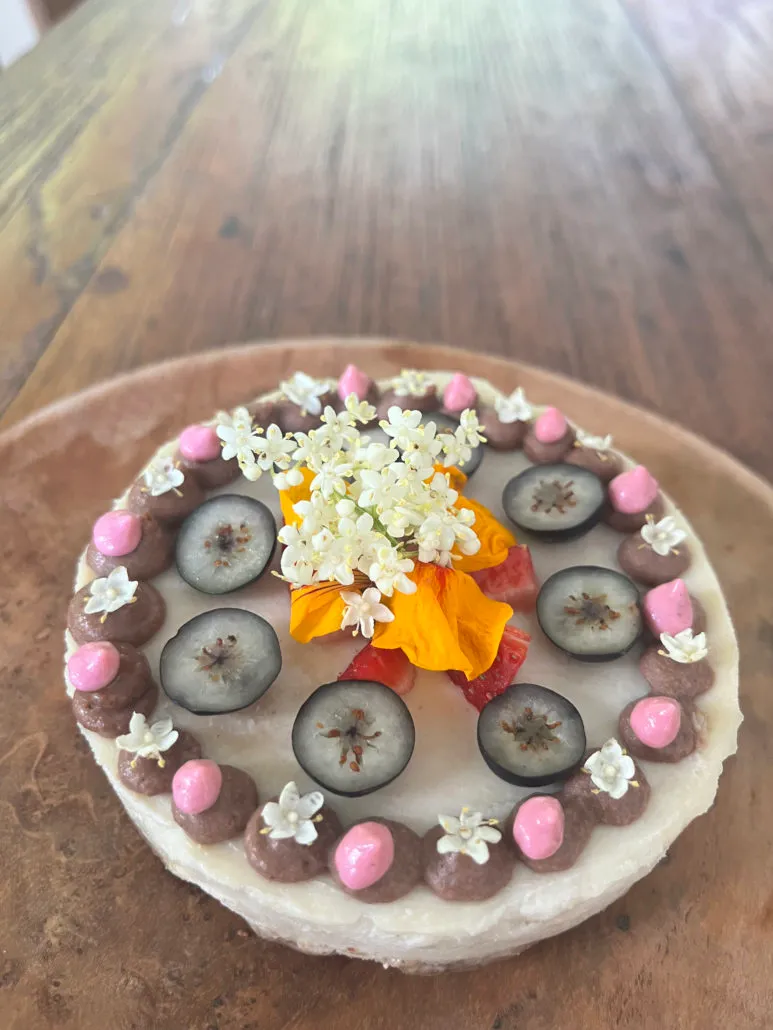
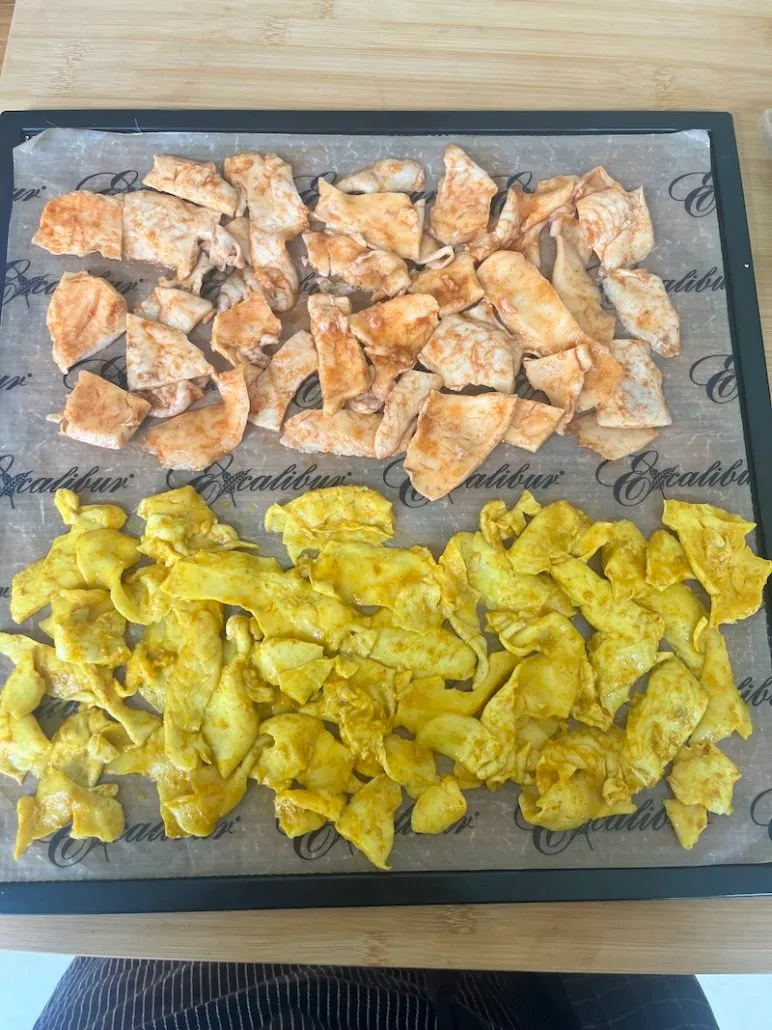
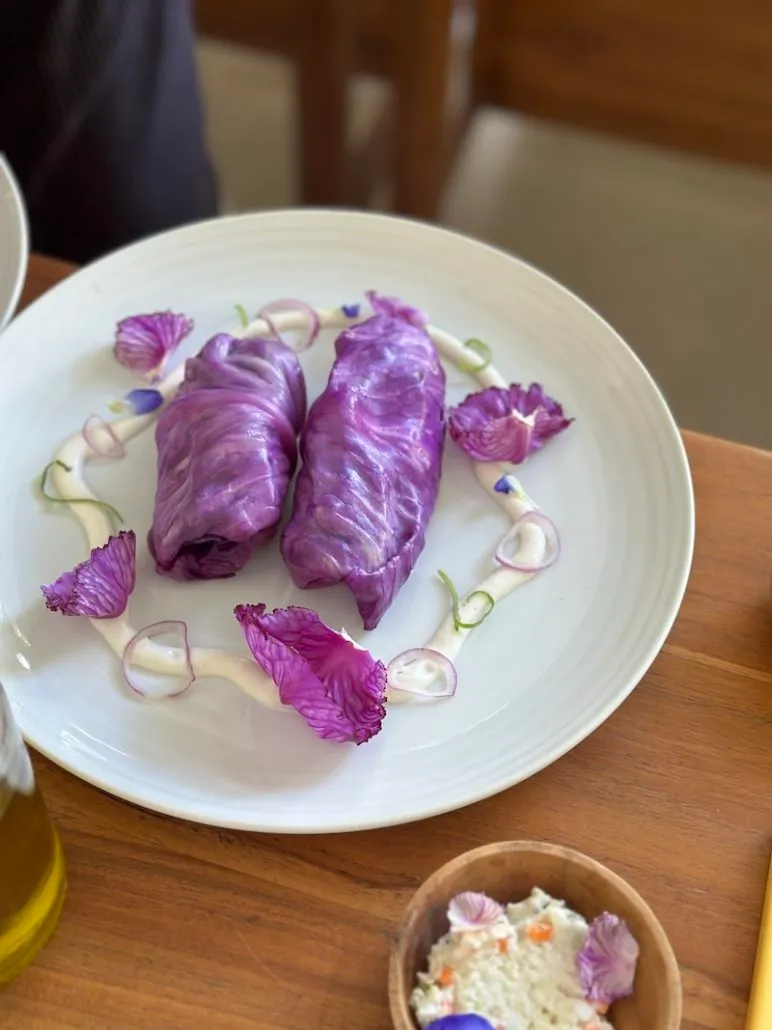
“Penso che in questo momento in cui la cucina plant-based è già evoluta da tempo, il suo più grande potenziale sia aiutare le persone a vedere altre possibilità” racconta Lauren mentre sorseggiamo una bevanda al cacao, una pianta davvero preziosa in questa alimentazione e protagonista di una delle cerimonie svolte durante il corso. “In tante culture le ricette tipiche vengono indicate in modo preciso. In luoghi come Bali e Messico invece ci sono molte più variabili. Qui, ad esempio, uno dei piatti tipici è il Nasi Campur con riso, verdure, carne ma in realtà non esiste una sola versione. Credo che questa predisposizione di base abbia aiutato ad accogliere qui il ricco panorama del cibo plant-based dove ogni cosa può essere immaginata e creata. Un altro aspetto favoloso di questo mondo è l’utilizzo di ingredienti che molte persone non conoscono, ingredienti spesso di natura medicinale davvero benefici sia per il nostro corpo che per la nostra mente. Questo è il Mind Food su cui ho scritto un libro (Mind Food – Ricette vegetali per una salute mentale positiva) per portare sul tavolo la discussione della salute mentale. È un tipo di alimentazione che lavora più sulla prevenzione che sulla cura poiché riguarda una consapevolezza più profonda di come il cibo ci fa sentire in ogni suo aspetto dal sapore, al colore, all’odore. Quindi se non riesci a dormire, ad esempio, il cibo può aiutarti a sentirti più rilassato oppure a trovare il tuo equilibrio, altri alimenti invece stimolano l’energia ma soprattutto si tratta di essere in connessione con la tua intuizione, di rimanere più connesso con te stesso e comprendere da solo di cosa il tuo corpo ha bisogno”.
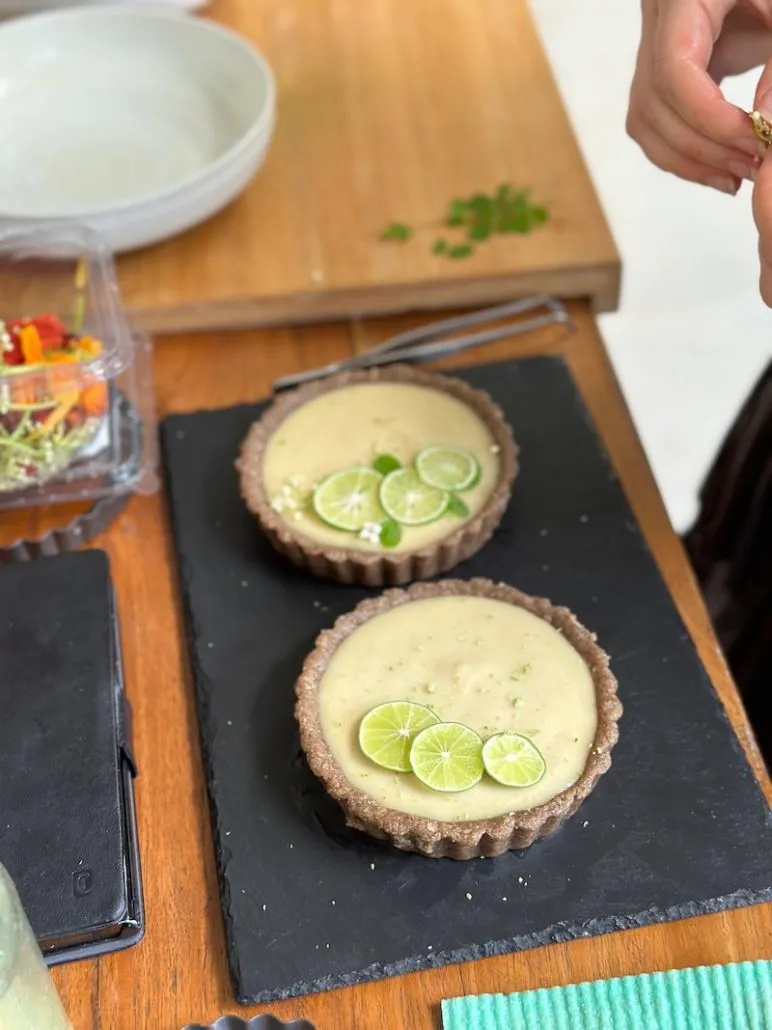
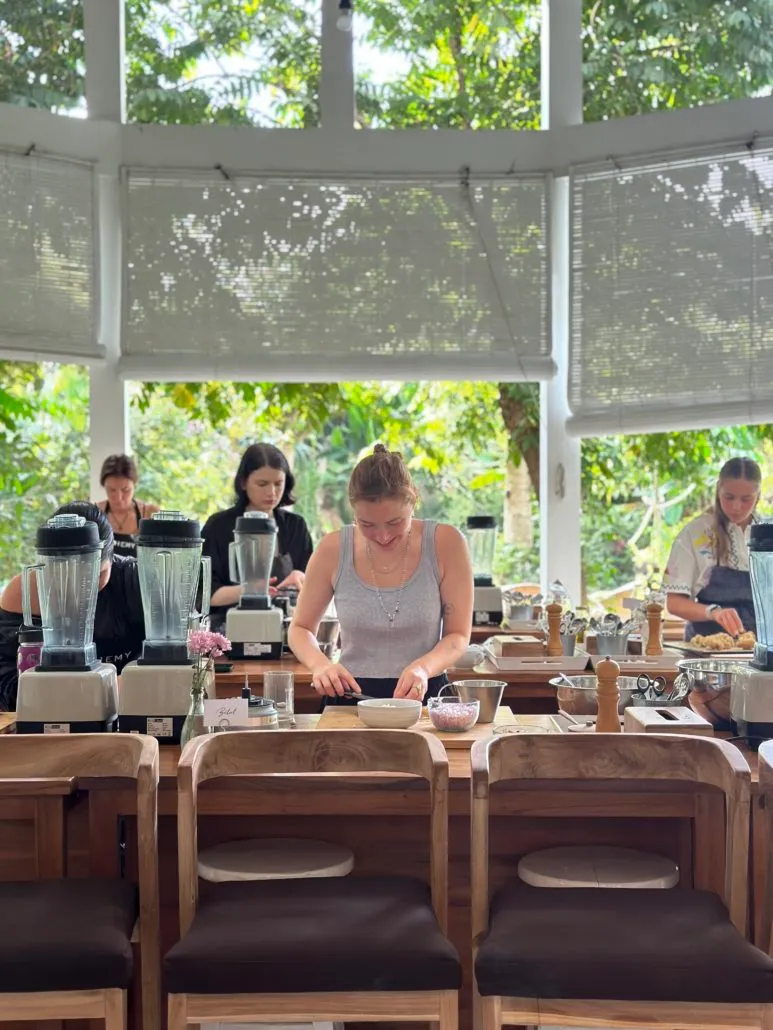
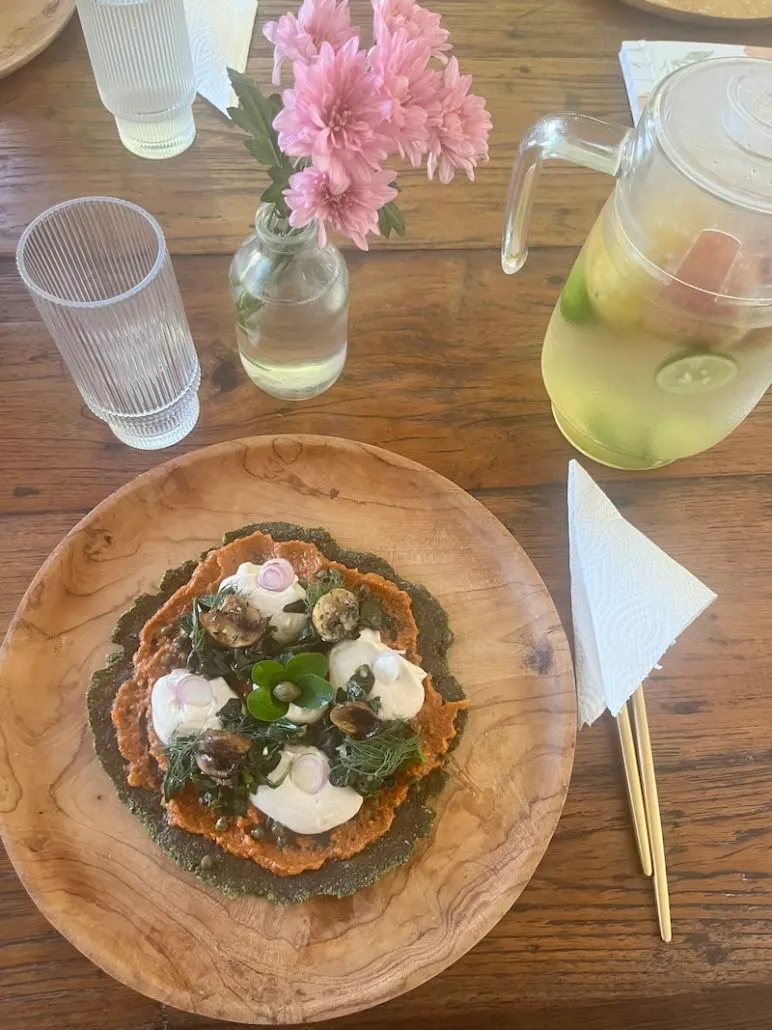
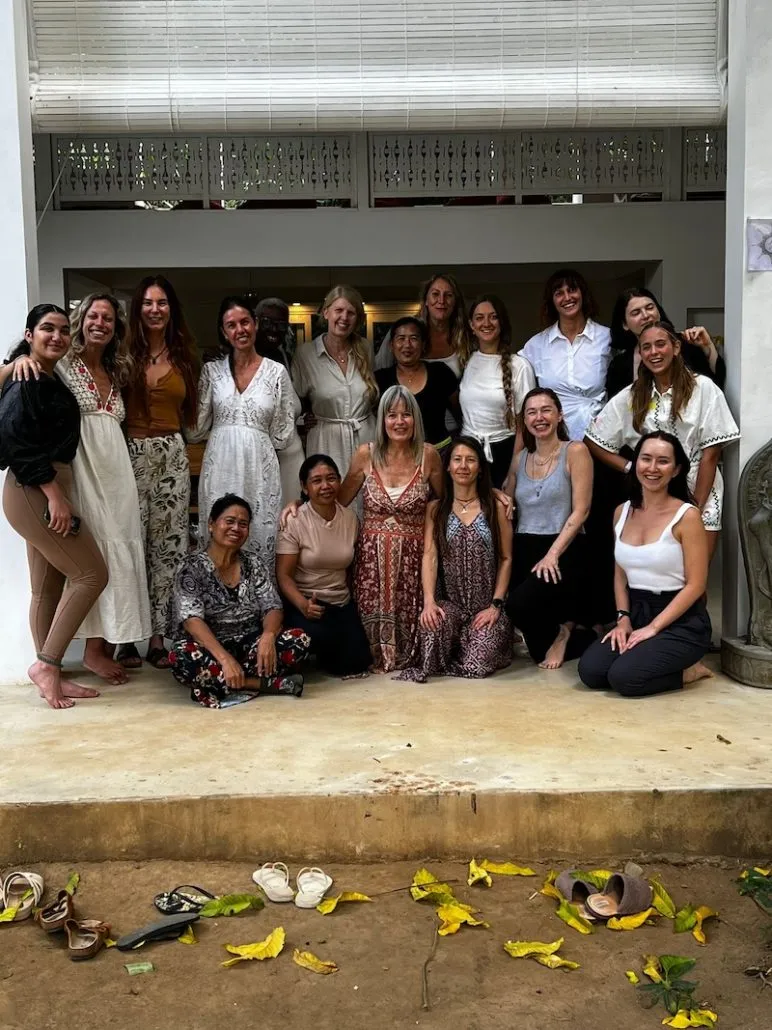
Dalla fermentazione, un processo ormai conosciuto per la sua capacità di migliorare la digestione, a come “cucinare” utilizzando il disidratatore strumento fondamentale per realizzare innumerevoli piatti – tra cui la base per la pizza, i crackers – e per esaltare il sapore dei cibi mantenendone tutti i principi nutritivi e ancora come creare la versione raw di tanti piatti conosciuti combinando in modo incredibile diversi ingredienti. “Con il cibo crudo puoi sperimentare davvero oltre l’immaginabile – spiega Carolina – Per questo l’offerta è sempre più vasta e bisogna anche scegliere con attenzione sia la materia prima che il prodotto finale. Credo che il punto di partenza sia pensare a che tipo di mondo vogliamo creare e, di conseguenza a questo pensiero, che cibo vogliamo mangiare. Dovremmo ridurre su ogni fronte l’impatto che abbiamo sul Pianeta, essere meno concentrati su noi stessi e pensare di più a cosa possiamo fare per gli altri, risvegliarci alla profonda interconnessione tra tutto e tutti”.
Scopri tutto sull’Alchemy Academy: www.alchemyacademy.world
–––––––––––––––––––––––––––––––––––––––––––––––––––––––––––––––––––––––––––––––––––––––-
Learning the art of plant-based food at Alchemy Academy in Bali
Words by Cristina Ropa
“What if you just did it your own way? No rules, no right or wrong, just what you think is beautiful?” children’s book author Sandra Magsamen reflects. How often do we act based on external influences rather than on our deepest feelings? It’s about leaving your comfort zone, following that purest and most unconstrained inner drive, accepting the risk of making mistakes and perhaps opening up scenarios capable of generating value and new lifestyles full of beauty and well-being. Shanti Allen, an international chef and one of the founders of Alchemy, the first vegan restaurant in Bali, has managed to make this leap by going in the direction of her dreams made of love for the Planet and passion for plant-based food. In 2017 she founded the Alchemy Academy, a place to train new “alchemists” by deepening and experimenting with the extraordinary potential of vegan food full of vital energy and learn to think outside the box, to dream big, very big, to believe in the flow of life, in the synchronicity of encounters, in the strength of bonds like those created during the Level 1 course dedicated to raw vegan food, held from 8 to 19 July 2024 with people from all over the world in which I had the honor and fortune of participating. Brazil, Ukraine, Italy, Norway, England, South Africa, the Caribbean, Spain, Sweden, California, Turkey, Germany, gathered under the same roof in an open space kitchen immersed in the jungle, eager to delve into this fascinating world, full of wonderful possibilities and so precious for our health and at the same time for the Planet. It is no coincidence that Alchemy Academy is located the city of Ubud, the cultural capital of the island, whose word derives from the Balinese Ubad which means medicine in their traditional language, inspired by the abundance of medicinal plants and herbs present in this area, a city where artists, intellectuals, writers moved in the 70s, a movement of enormous importance from which originated the splendid energy still present today.
“Raw food is an invitation to eat more in line with Mother Nature,” Shanti, whose Sanskrit name means “inner peace,” tells me, which is what she embodies and tries to convey through this revolutionary way of living.” “The ingredients are processed as little as possible to enhance and preserve their essence as well as their nutritional value. Raw food cooking uses lots of fresh, organic, brightly colored fruits, vegetables, herbs, nuts, seeds, sprouts, spices, and superfoods. They naturally contain all the vitamins, minerals, phytonutrients, fiber, and antioxidants needed to nourish and sustain us as humans, but it is not necessary to completely convert our diet to raw food. Simply adding 50% fresh, raw vegetables or fruits to our regular meals is already an action that can have an incredible impact on our health and the environment.” This is because the less our food is processed and cooked – in fact in this type of diet the “cooking” temperature in the dehydrator must not exceed 43 °C (118 °F) – the more life force it retains. And when you eat life force, you get life force as I talk about in my first book The Raw Alchemist. Shanti speaks slowly, sweetly and reflecting on the words. A rhythm that transmits tranquility, a way of interacting that subverts the frenzy of the Western world and brings us back to the here and now. Staying in the present moment and becoming deeply aware of what we are and do is essential to learning to know and respect our real needs and bring our attention back to what really matters. “It is scientifically proven – she continues – that the benefits of a raw food diet are countless: you absorb more enzymes that would otherwise be killed by the high temperatures of cooking; you get more hydration for the body in the most natural way possible since fresh vegetables and fruit contain more than 80% water; it helps you find your ideal weight and therefore not go towards excesses that are always harmful; improves health and longevity by helping to reduce the onset of diabetes, arthritis, colitis and cancer; helps not to accumulate toxins in the colon and organs and has a much smaller impact on the environment compared to an omnivorous diet”. It is a truly holistic and beneficial approach to life whose essence also touches those more subtle and invisible levels. At the basis of vegan food, in fact, there is the profound belief that everything is interconnected: nature, people, experiences, everything has a profound meaning.
For this reason, during the course, the practical and material part of preparing food was constantly accompanied by taking care of the interior level, that emotional sphere inseparable from the exterior and fundamental for having the right attitude to create happiness and value around us. The opening ceremony of the course was the first example of how important it is to connect with ourselves and others, to start from bonds. Around a beautiful mandala made of colorful flowers, stones and candles created by yoga teacher Emmalee Bevan, present every morning for those who wanted to start the day in a regenerating way, we shared thoughts, emotions, experiences to encourage and inspire each other. Each day was marked by a rich and varied program organized according to the reference manual with all the recipes developed by Shanti and guided with professionalism and enthusiasm by chefs Lauren Lovatt and Carolina Chinea, among the major international experts in plant-based food, capable of listening with patience and kindness to every doubt and difficulty, placing at the center an equal relationship “where the role of the teacher – said Carolina – is not to provide answers but to ask the right questions to help people find the right answer for what they want to achieve. Plant-based food opens up to infinite creativity and therefore it is important to understand first of all what you want to achieve. The vision you have of a dish is fundamental. The other important aspect is the flavor that we can create through the combination of the various ingredients. When it comes to raw food, where the processing takes place with a more delicate raw material, a lot of concentration and attention is needed”. Finding the combination of flavors that can release what you want to create, that sometimes sudden alchemy that occurs through long concentration and experimentation, requires a lot of time and patience, but first you start from a fundamental element: cleanliness and mise en place. These were the first topics covered during the lessons, those foundations necessary to create a solid structure on which to develop everything else and to feel, from the second day, that you are fully inside a flow made of movements, awareness of the places from which to draw the ingredients, how to read the recipes and also of glances, complicity with your seat neighbor with whom you often collaborated in creating the dishes. A harmony born spontaneously through the extraordinary clarity, enthusiasm and professionalism of Lauren, Carolina and Shanti, as well as from the predisposition of the students to welcome, learn, grow with sensitivity and love. From this a joyful and constructive atmosphere sprouted even when something did not work out as desired and then fully blossomed after two weeks of intense work in the final project where everyone gave free rein to their imagination by creating a main course and a dessert: from the raw and vegan version of typical Balinese dishes, to the inspiration born from their country of origin or from the lush nature and animals present in Bali, everyone was able to fully express themselves.
“I think that at this time when plant-based cuisine has already evolved for some time, its greatest potential is to help people see other possibilities – Lauren tells me while we sip a cocoa drink, a truly precious plant in this diet and the protagonist of one of the ceremonies held during the course – In many cultures, typical recipes are indicated precisely. In places like Bali and Mexico, however, there are many more variables. Here, for example, one of the typical dishes is Nasi Campur with rice, vegetables, meat but in reality, there is not just one version. I believe that this basic predisposition has helped to welcome the rich panorama of plant-based food here where everything can be imagined and created. Another fabulous aspect of this world is the use of ingredients that many people do not know, ingredients often of a medicinal nature that are truly beneficial for both our body and our mind. This is the Mind Food on which I wrote a book (Mind Food – Plant-based recipes for positive mental health) to bring the discussion on mental health to the table. It is a type of diet that works more on prevention than on cure because it involves a deeper awareness of how food makes us feel in every aspect of its flavor, color, smell. So, if you can’t sleep, for example, food can help you feel more relaxed or find your balance, others instead stimulate energy but above all it is about being in connection with your intuition, staying more connected with yourself and understanding for yourself what your body needs”. From fermentation, a process now known for its ability to improve digestion to how to “cook” using the dehydrator, a fundamental tool for making countless dishes including pizza bases, crackers, to enhance the flavor of foods while maintaining all their nutritional principles and even how to create the raw version of many well-known dishes by combining different ingredients in an incredible way. “With raw food you can really experiment beyond what you could ever imagine – Carolina explains to me – This is why the offer is increasingly vast and you also have to carefully choose both the raw material and the final product. I think the starting point is to think about what kind of world we want to create and consequently to this thought what kind of food we want to eat. We should reduce on every front the impact we have on the Planet, be less focused on ourselves and think more about what we can do for others, awaken to the deep interconnection between everything and everyone”.




